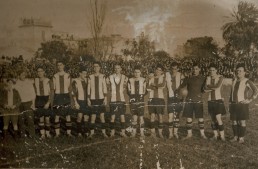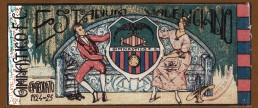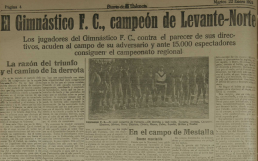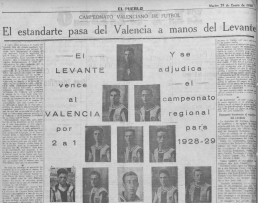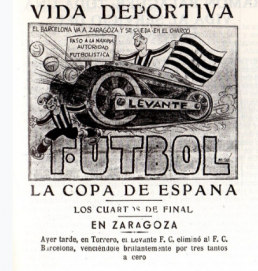The Levante F.C. starting eleven from the 1927-28 season win the Regional Championship
The regulation of football occurred during the decades of the twenties and thirties. Coincidentally it became a general phenomenon in the field of national football. Levante F.C. and Gimnástico F.C. were leading players in establishing the sport. During this period they obtained their first victories on the field of play and enhanced the structure of the sport.
Ticket of Gimnástico
Levante, together with Gimnástico, had the ability to endure in a very complicated period for the growth of contemporary clubs related to the first football matches that took place in the city. Most of them disappeared, leaving hardly any trace or evidence of their existence. That was not the case with Levante or Gimnástico, who in the 1920s strengthened their internal structure, and held the status of the chief representatives of the football that was played in the shadow of the Miguelete Tower in Valencia. The inauguration of the Campo de La Cruz in September 1922 and the opening of the Valencian or Vallejo Stadium in 1925 were notable milestones that emphasised the weight and strength of Levante and Gimnástico in Valencian society.
News from the Diario de Valencia newspaper in January 1924
Gimnástico celebrated its third Regional Championship title in the 1923-1924 season. At the dawn of the decade they commenced their sports record with two accomplishments that established their rise. The fight against Valencia on the field of play for football supremacy in the city was merciless. That battle was sometimes transferred to the offices. The status as champion in the 1923-1924 season, won on the field of play, was not exempt from setbacks.
In the summer of 1924 the transfer of Enrique Molina from Gimnástico to Valencia generated a bitter controversy. He was one of the most outstanding figures of the playing squad. The effects of professionalism were evident for a club which defended ideals that moved away from the guidelines which marked the evolution of football: Gimnástico defended a more amateur concept of the sport. In the middle of the debate about the birth of the League, they leaned towards the supremacy of the Regional Championships. It is obvious that football was distancing itself from that approach.
News from the El Pueblo newspaper of January 24, 1928
Levante embarked on a series of triumphs in the second half of the twenties. In January 1928 they submitted to Valencia at the Campo de La Cruz in a duel wrapped up with the final score (2-1). The marine squad turned the score around in an afternoon full of symbolism. Levante raised the cup to the sky as a sign of triumph and managed to intervene in the football debate traditionally led by Valencia and Gimnástico. That rivalry spread with the arrival of the club led from the pitch by Juan Puig. That rise was not easy. The early twenties were characterised by shadows. During that complex stage, The Invincibles emerged to stir the pride of an institution depressed about the lack of success from its most representative team.
Synopsis of the victory over Barcelona in the Spanish Cup
The decade of the thirties meant the consolidation of the league competition as a regular championship played in a double confrontation that began in the 1928-1929 season. Levante and Gimnástico joined the Third Division at the start of the third decade of the 20th century. Gimnástico would suffer dissent among its militants.
Part of the rectory leadership undertook a new adventure with the birth of the C.D. Peña Azulgrana. Both clubs benefitted from the restructuring of the category to become tenants of the Second Division in the 1934-1935 season. That season would serve as a border for a Levante that would underline its name in red to take over the Superregional Championship that was born with a fratricidal tie between the Poblados Marítimos club and the Gimnástico.
The season was dizzying. Levante reduced Valencia and Barcelona in the Spanish Cup to reach the semifinal against Sabadell. The War tore the ascendant of a group that fantasized about unimaginable heights. However, in July 1937, in the midst of the Civil War, they won the Free Spain Cup after defeating Valencia in the supreme confrontation at the Sarrià Stadium in Barcelona.
